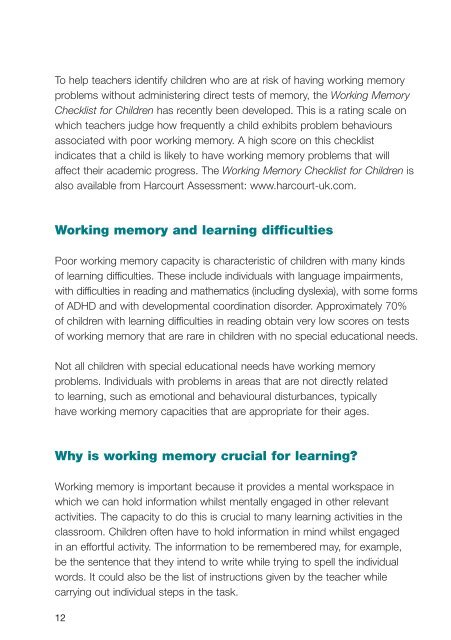Classroom guide
Classroom guide
Classroom guide
You also want an ePaper? Increase the reach of your titles
YUMPU automatically turns print PDFs into web optimized ePapers that Google loves.
To help teachers identify children who are at risk of having working memory<br />
problems without administering direct tests of memory, the Working Memory<br />
Checklist for Children has recently been developed. This is a rating scale on<br />
which teachers judge how frequently a child exhibits problem behaviours<br />
associated with poor working memory. A high score on this checklist<br />
indicates that a child is likely to have working memory problems that will<br />
affect their academic progress. The Working Memory Checklist for Children is<br />
also available from Harcourt Assessment: www.harcourt-uk.com.<br />
Working memory and learning difficulties<br />
Poor working memory capacity is characteristic of children with many kinds<br />
of learning difficulties. These include individuals with language impairments,<br />
with difficulties in reading and mathematics (including dyslexia), with some forms<br />
of ADHD and with developmental coordination disorder. Approximately 70%<br />
of children with learning difficulties in reading obtain very low scores on tests<br />
of working memory that are rare in children with no special educational needs.<br />
Not all children with special educational needs have working memory<br />
problems. Individuals with problems in areas that are not directly related<br />
to learning, such as emotional and behavioural disturbances, typically<br />
have working memory capacities that are appropriate for their ages.<br />
Why is working memory crucial for learning?<br />
Working memory is important because it provides a mental workspace in<br />
which we can hold information whilst mentally engaged in other relevant<br />
activities. The capacity to do this is crucial to many learning activities in the<br />
classroom. Children often have to hold information in mind whilst engaged<br />
in an effortful activity. The information to be remembered may, for example,<br />
be the sentence that they intend to write while trying to spell the individual<br />
words. It could also be the list of instructions given by the teacher while<br />
carrying out individual steps in the task.<br />
12



